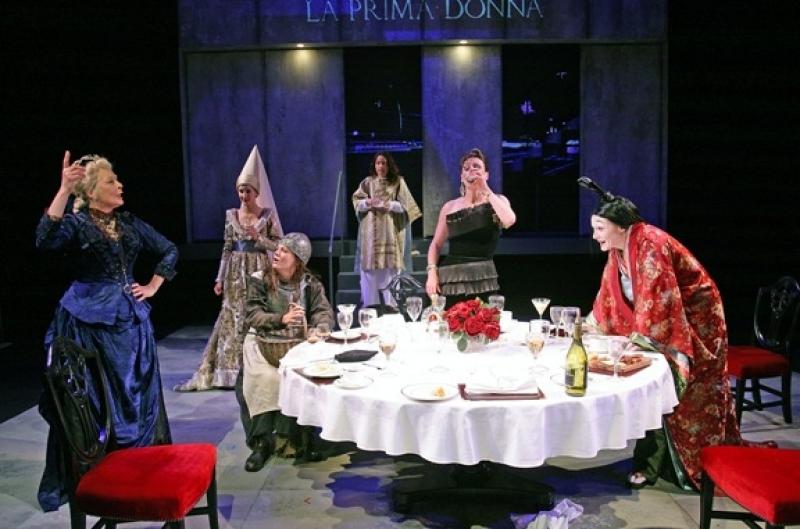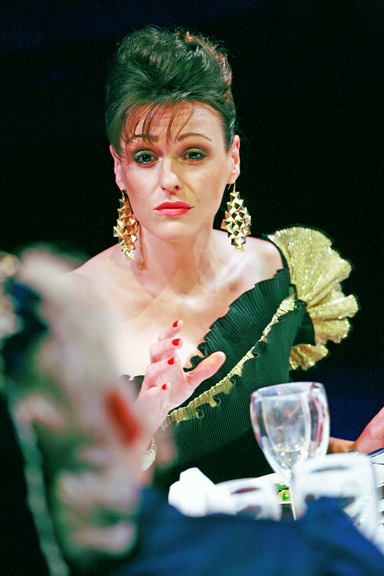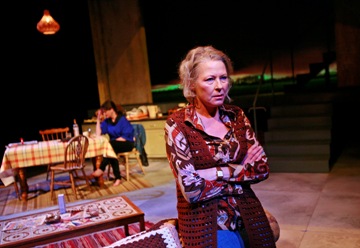Top Girls, Minerva Theatre Chichester | reviews, news & interviews
Top Girls, Minerva Theatre Chichester
Top Girls, Minerva Theatre Chichester
Revival of Caryl Churchill's best known play burns bright then fades

The remarkable thing about Caryl Churchill, Max Stafford-Clark has said, is that she is "completely new, every time she comes out of the box". Watching the first act to his revival of her most celebrated work, which Stafford-Clark revisits for Chichester Festival 29 years after he directed its Royal Court premiere, you feel Top Girls isn’t so much being lifted fresh from that box as bursting through the lid.
A surreal yet psychologically spot-on set-up for the scenes of Eighties professional and domestic life to come, its extraordinary opening scene conflates centuries, continents, life stories and whole passages of dialogue. And here every drop of humour and pathos is wrung from the script, along with every drop of booze from the table, by a cast who are clearly relishing each minute. Marlene (Suranne Jones) – a go-getting Eighties New Woman (pictured below) with the slick social manners, stiletto heels and finger-clicking treatment of the silent waitress to prove it – has invited five powerful women from history and legend to celebrate her promotion to MD of the Top Girls Employment Agency.
 In a measure of both her gutsy she-who-dares self-determinism and disregard for the old rules, and Churchill’s own commitment to presenting as broad a possible range of women’s voices, the guest list for the dinner party ranges from a ninth-century pope to a character from Chaucer. Excited to be out and to be heard, they talk over each other in a perfectly orchestrated chorus of female experience. But the exuberant clamour to connect quickly turns into a misery competition as each retreats further into her own horrible history.
In a measure of both her gutsy she-who-dares self-determinism and disregard for the old rules, and Churchill’s own commitment to presenting as broad a possible range of women’s voices, the guest list for the dinner party ranges from a ninth-century pope to a character from Chaucer. Excited to be out and to be heard, they talk over each other in a perfectly orchestrated chorus of female experience. But the exuberant clamour to connect quickly turns into a misery competition as each retreats further into her own horrible history.
 Tim Shortall’s design (restaurant Prima Donna is a chandelier-decked affair through whose windows bright neon streaks zip by in the distance – an abstract view of life in the fast lane) extends the comic impact of the womens’ entrances with two sets of steps. First to arrive, regal in blue with a rich Scottish accent, is Stella Gonet as the Victorian traveller Isabella Bird. Next comes Catherine McCormack’s Lady Nijo (pictured left), every painted and silk-wrapped inch the Japanese emperor’s concubine but betraying her sweet composure with an anxiously fluttering fan. Laura Elphinstone’s pale, pinched and princess-peaked Patient Griselda arrives just in time for pudding, by which point Lucy Briers’ fantastic turn as the cross-dressing Pope Joan (just mannish enough in her mannerisms and with the broad charisma of an experienced crowd commander) is climaxing in a spurt of Latin and vomit. Only Olivia Poulet fails to seize her sixth of the scene as the gruff Dull Gret, housewifely hell harrier of Flemish folklore. She needs to lob her hilariously coarse monosyllabic contributions with the same oomph as she does the bread rolls.
Tim Shortall’s design (restaurant Prima Donna is a chandelier-decked affair through whose windows bright neon streaks zip by in the distance – an abstract view of life in the fast lane) extends the comic impact of the womens’ entrances with two sets of steps. First to arrive, regal in blue with a rich Scottish accent, is Stella Gonet as the Victorian traveller Isabella Bird. Next comes Catherine McCormack’s Lady Nijo (pictured left), every painted and silk-wrapped inch the Japanese emperor’s concubine but betraying her sweet composure with an anxiously fluttering fan. Laura Elphinstone’s pale, pinched and princess-peaked Patient Griselda arrives just in time for pudding, by which point Lucy Briers’ fantastic turn as the cross-dressing Pope Joan (just mannish enough in her mannerisms and with the broad charisma of an experienced crowd commander) is climaxing in a spurt of Latin and vomit. Only Olivia Poulet fails to seize her sixth of the scene as the gruff Dull Gret, housewifely hell harrier of Flemish folklore. She needs to lob her hilariously coarse monosyllabic contributions with the same oomph as she does the bread rolls.
If the play ended there you’d be toasting a fairly fantastic piece of theatre. But as Churchill goes on to examine the hollowness of the triumphs of Thatcher’s Britain, and in particular of feminism when it parts company with socialism, this production’s theatrical bubbles go distinctly flat. In a doubling of parts that almost replicates Stafford-Clark’s original scheme, Poulet plays Angie, Marlene’s imaginatively sharp but academically and socially slow 16-year-old daughter, who has been raised in the country by her stay-home sister Joyce (Gonet) and is in danger of being left behind again by a society that offers no help to the "stupid, lazy or frightened". Meanwhile Elphinstone and McCormack become Marlene’s colleagues at the Top Girls office, where the women have adopted the ruthless male business code and discourse along with the desk space.
There’s almost as much humour to be mined here as in Act I – especially in the quick-fire series of slap-in-the-face-style interviews conducted by the staff of Top Girls with their female clients. And given the halting progress of women’s rights and the Tory axe currently poised over the welfare state, there’s no question the content itself is still horribly relevant.
 But a few unsuccessful directorial decisions, and actor pairings that simply fail to spark, result in a significant shortfall of energy and credulity. With West Country accent, wellies and a sulky perch on a hay bale, Angie comes off as a sort of country bumpkin, while her 12-year-old friend Kit (Lisa Kerr), who is supposed to provide the younger but sharper contrast, is as much of a duck-footed, T-shirt-twisting ingénue. Meanwhile the impulse to fill the Minerva’s square space in Act III contributes problems for Jones and Gonet as Marlene (pictured right) visits sister Joyce and, over whisky in the kitchen, confronts the claustrophobic, prospectless life she has battled to escape. In contrast to the view from Marlene’s office (the windows of an opposite tower block gleaming in a cloudy blue sky, metaphorical glass ceiling far below), here the back screen shows a slash of red across an immense black rural horizon, serving ironic comment on Marlene’s optimistic forecast: "On, on into the sunset. I think the Eighties are going to be stupendous!" But with so much sheer physical space between the sisters, less seems emotionally at stake – you don’t feel the bitterness, or the love.
But a few unsuccessful directorial decisions, and actor pairings that simply fail to spark, result in a significant shortfall of energy and credulity. With West Country accent, wellies and a sulky perch on a hay bale, Angie comes off as a sort of country bumpkin, while her 12-year-old friend Kit (Lisa Kerr), who is supposed to provide the younger but sharper contrast, is as much of a duck-footed, T-shirt-twisting ingénue. Meanwhile the impulse to fill the Minerva’s square space in Act III contributes problems for Jones and Gonet as Marlene (pictured right) visits sister Joyce and, over whisky in the kitchen, confronts the claustrophobic, prospectless life she has battled to escape. In contrast to the view from Marlene’s office (the windows of an opposite tower block gleaming in a cloudy blue sky, metaphorical glass ceiling far below), here the back screen shows a slash of red across an immense black rural horizon, serving ironic comment on Marlene’s optimistic forecast: "On, on into the sunset. I think the Eighties are going to be stupendous!" But with so much sheer physical space between the sisters, less seems emotionally at stake – you don’t feel the bitterness, or the love.
The impact of the near perfect first act lingers. But, progressively under-powered, the second and third make the projected images of "iconic" women through the ages (from Anne Frank to Princess Diana) and the less than subtly selected period pop that blares out between scenes (Dolly Parton’s "Nine to Five", The Specials’ "Too Much Too Young"...) seem like so much self-consciously applied shoulder padding.
The future of Arts Journalism
You can stop theartsdesk.com closing!
We urgently need financing to survive. Our fundraising drive has thus far raised £33,000 but we need to reach £100,000 or we will be forced to close. Please contribute here: https://gofund.me/c3f6033d
And if you can forward this information to anyone who might assist, we’d be grateful.

Subscribe to theartsdesk.com
Thank you for continuing to read our work on theartsdesk.com. For unlimited access to every article in its entirety, including our archive of more than 15,000 pieces, we're asking for £5 per month or £40 per year. We feel it's a very good deal, and hope you do too.
To take a subscription now simply click here.
And if you're looking for that extra gift for a friend or family member, why not treat them to a theartsdesk.com gift subscription?
more Theatre
 Ghosts, Lyric Hammersmith Theatre - turns out, they do fuck you up
Ten years on, Gary Owen and Rachel O'Riordan top their triumphant Iphigenia in Splott
Ghosts, Lyric Hammersmith Theatre - turns out, they do fuck you up
Ten years on, Gary Owen and Rachel O'Riordan top their triumphant Iphigenia in Splott
 All the Happy Things, Soho Theatre review - deep feelings, but little drama
New play about a sibling’s death is well imagined and deeply felt, but a bit slender
All the Happy Things, Soho Theatre review - deep feelings, but little drama
New play about a sibling’s death is well imagined and deeply felt, but a bit slender
 Shanghai Dolls, Kiln Theatre review - fascinating slice of history inadequately told
Amy Ng's take on two Chinese titans needs more dramatic ballast
Shanghai Dolls, Kiln Theatre review - fascinating slice of history inadequately told
Amy Ng's take on two Chinese titans needs more dramatic ballast
 Manhunt, Royal Court review - terrifyingly toxic masculinity
After his Olivier Award win for Oedipus, Robert Icke turns to a modern “monster”
Manhunt, Royal Court review - terrifyingly toxic masculinity
After his Olivier Award win for Oedipus, Robert Icke turns to a modern “monster”
 Midnight Cowboy, Southwark Playhouse - new musical cannot escape the movie's long shadow
Two misfits misfire in misconceived show
Midnight Cowboy, Southwark Playhouse - new musical cannot escape the movie's long shadow
Two misfits misfire in misconceived show
 Thanks for Having Me, Riverside Studios review - snappily performed comedy with a lightweight core
Writer-actor Keelan Kember floods the stage with a torrent of gags but few ideas
Thanks for Having Me, Riverside Studios review - snappily performed comedy with a lightweight core
Writer-actor Keelan Kember floods the stage with a torrent of gags but few ideas
 Rhinoceros, Almeida Theatre review - joyously absurd and absurdly joyful
Ionesco classic gets an entertainingly vivid and contemporary update
Rhinoceros, Almeida Theatre review - joyously absurd and absurdly joyful
Ionesco classic gets an entertainingly vivid and contemporary update
 The Importance of Being Oscar, Jermyn Street Theatre review - Wilde, still burning bright
Alastair Whatley honours his subject in a quietly powerful performance
The Importance of Being Oscar, Jermyn Street Theatre review - Wilde, still burning bright
Alastair Whatley honours his subject in a quietly powerful performance
 Stiletto, Charing Cross Theatre review - new musical excess
Quirky, operatic show won't please everyone, but will delight many
Stiletto, Charing Cross Theatre review - new musical excess
Quirky, operatic show won't please everyone, but will delight many
 Alfred Hitchcock Presents: The Musical, Theatre Royal Bath review - not a screaming success
1950s America feels a lot like 2020s America in this portmanteau show
Alfred Hitchcock Presents: The Musical, Theatre Royal Bath review - not a screaming success
1950s America feels a lot like 2020s America in this portmanteau show
 Wilko: Love and Death and Rock'n'Roll, Southwark Playhouse review - charismatic reincarnation of a rock legend
Johnson Willis captures the anarchic energy and wit of the late guitarist
Wilko: Love and Death and Rock'n'Roll, Southwark Playhouse review - charismatic reincarnation of a rock legend
Johnson Willis captures the anarchic energy and wit of the late guitarist

Add comment